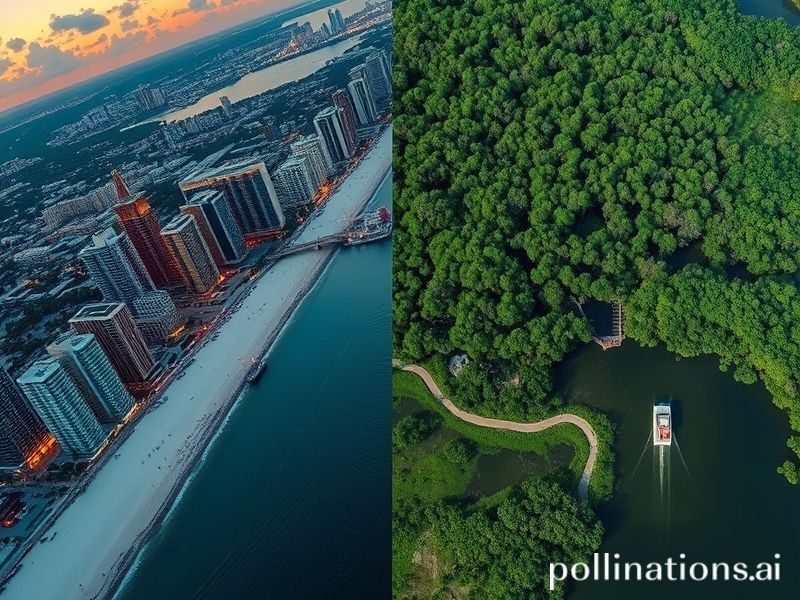South Florida vs Florida: The World’s Favorite Climate Divorce Drama
South Florida vs. Florida: A Micro-Civil War the World Is Quietly Rooting For
By Matteo Vargas, International Affairs Correspondent
MIAMI—In the grand theatre of geopolitical schadenfreude, few spectacles delight foreign capitals quite like an American region threatening to secede from itself. From Berlin think tanks to Tokyo trading desks, analysts have begun tracking “SoFloExit” the way ornithologists monitor an exotic bird that might either learn to speak or spontaneously combust.
The quarrel, stripped of its sun-blanched absurdities, is straightforward: South Florida (roughly everything below Disney’s strategically placed enchanted moat) has discovered that the rest of the state—North Florida, the Panhandle, the cattle-rattling hinterlands—regards climate change the way the 14th century regarded witchcraft: interesting in theory, punishable if it costs money. South Florida, meanwhile, is busy hiring Dutch engineers to keep Brickell high-rises from becoming expensive aquariums.
To outside observers, the spat is a live-action case study in what happens when a sub-tropical Versailles tries to divorce a humid Rust Belt. The World Bank, ever hungry for fresh metaphors, now refers to the standoff as “the first internal climate migration that forgot to migrate.” Delegations from Jakarta and Lagos have flown in for tips on how to bicker effectively while the tide rolls in.
Europeans, nursing centuries of practice in civilised fragmentation, watch with the smug tolerance of a sommelier observing toddlers fight over grape juice. Le Monde recently ran a cartoon depicting the peninsula sawing itself off and floating toward Cuba, captioned “Floride Libre enfin, avec plus de rhum.” The British Foreign Office, still giddy from Brexit, has reportedly offered “technical assistance in self-harm,” codename Operation Tangerine Tantrum.
China, ever pragmatic, simply bought more South Florida real estate. Beijing’s state media calls the dispute “a decadent contradiction of late-stage capitalism,” which translates roughly to “Please keep the golf courses intact until closing.”
The global supply chain implications are already percolating. Should the 954 and 305 area codes decide to issue their own passports, analysts predict a 12% spike in the price of key lime futures, a commodity now treated with the same volatility as rare earth metals. Meanwhile, the Panhandle’s plan to revive the Confederacy Lite™ brand risks triggering retaliatory tariffs on Florida Man memes—an export the State Department quietly lists under “cultural services.”
Financial markets have responded with the enthusiasm of a dog discovering a mirror. Deutsche Bank’s new “SunSec” index tracks municipal bonds issued in both “Upper Florida” (ticker: REDN) and “Lower Florida” (ticker: TIDE). Trading volumes spike every time a county commissioner tweets something inflammatory about seawalls or secession. The Swiss, never missing an opportunity, now sell dual-currency watches that flip between Eastern and Central Daylight Savings Time when you cross the proposed border at Yeehaw Junction.
Behind the jokes lurks an uncomfortable truth: the fight is a preview of coming attractions for every coastal megalopolis. Lagos, Mumbai, and Venice are taking notes on how to weaponise grievance while the ocean knocks politely at the door. The UN Framework Convention on Climate Change has quietly added a new agenda item: “Subnational Divorce Mediation,” complete with a suggested seating chart that keeps polar bears away from oil lobbyists.
For South Floridians, the prospect of independence carries the giddy promise of legalised sports betting, state-funded mojitos, and a seat at the UN between Malta and the Marshall Islands. North Floridians, meanwhile, dream of a utopia where the only Spanish spoken comes from the Taco Bell drive-thru.
In the end, the world will keep sipping café cortaditos and watching the tide rise. Because if Florida can’t figure out how to stay in one piece, what hope is there for the rest of us? And should the peninsula cleave in two, cartographers from Reykjavík to Riyadh will shrug and update their maps—then quietly invest in floating real-estate ETFs. After all, nothing says “globalisation” quite like betting on which half of a sunshine state sinks first.
The rest of us will simply refresh our feeds, grateful for the distraction from our own impending submersion.







